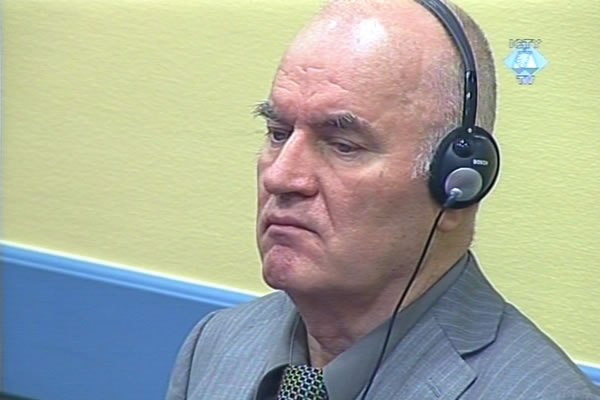Home
MLADIC POSTPONED PLEA ON ‘OBNOXIOUS’ CHARGES
In his initial appearance before the Tribunal, the former commander of the VRS Main Staff acted as if he didn’t know what he was charged with and why he had to be in hiding for 16 years. Mladic asked to be allowed to postpone entering his plea until he familiarized himself with ‘the obnoxious charges’ and ‘monstrous words’ in the indictment. Mladic’s second appearance before the court has been slated for 4 July 2011
 Ratko Mladic in the courtroom
Ratko Mladic in the courtroom In his initial appearance before the Tribunal, General Ratko Mladic refused to enter a plea on the indictment charging him in 11 counts with genocide and other crimes in BH. Under the Rules of Procedure and Evidence, the accused can enter a plea within 30 days of the initial appearance. Presiding judge Alphons Orie ordered the accused to return to the courtroom on 4 July 2011.
When he was asked if he received the indictment and was informed of its contents, the former commander of the VRS Main Staff said that he was given some materials. He didn’t read the materials, the accused said, adding that his duty counsel Aleksandar Aleksic showed him two pages of the indictment. Defense counsel Aleksic denied this, explaining that he had gone through the entire indictment, forty pages of text in Serbian, with the accused. Aleksic ‘never got the impression’ that Mladic was not aware of the charges against him. Asked if he wanted to have the entire indictment read out to him, Mladic replied, ‘I don’t want to hear a single letter or sentence of that indictment read out to me.’
Mladic nevertheless was compelled to hear the charges he faces because the Trial Chamber decided to read out the summary of the indictment at the hearing today ‘for the sake of both the accused and the public’. The presiding judge took about 20 minutes to briefly outline the 11 counts in the indictment, charging Mladic with double genocide, crimes against humanity and violations of law and customs of war he allegedly committed by participating in four joint criminal enterprises. The first joint criminal enterprise, described in the indictment as ‘comprehensive’ was the ethnic cleansing aimed at achieving the forcible and permanent removal of Bosnian Muslims and Croats from large parts of BH. In eight BH municipalities, the ethnic cleansing reached the scale of genocide. The other three joint criminal enterprises comprise the terror campaign against the civilians in Sarajevo, taking UN personnel hostage in May and June 1995 and genocide in Srebrenica in July 1995.
As the judge read out the summary of the indictment, the accused shook his head, particularly when genocide in Srebrenica was mentioned. After the summary, the accused acted as if he had never heard the charges against him before. It was as if he had been hiding from international justice for 16 years, without actually knowing what the charges against him were. Mladic said he would ‘want to read carefully the obnoxious charges’ and ‘monstrous words’ describing the crimes listed in the indictment. Among them are murder, persecution, extermination, deportation, torture, rape, attacks and terror against civilians and taking UN personnel hostage. Mladic insisted he would need more than a month to study the indictment. Judge Orie informed Mladic that under the Tribunal’s Rules he could enter his within 30 days. ‘As no valid reason against it has been put forth’, Judge Orie scheduled the second appearance for 4 July 2011 at 10 am.
Mladic arrived in the courtroom wearing a military-style cap and moved his hand as if to salute before he sat down in the dock. The years he spent in hiding and lack of medical care have visibly taken their toll. The retired general’s speech was slightly slurred, but Mladic nevertheless was able to articulate his opinion clearly. He said that he would ‘not defend Ratko Mladic, but the Serb nation and country’ before the court. Judge Orie then reminded Mladic that he himself was indicted, advising him to focus his defense on that. Mladic responded by nodding.
The accused asked to discuss his medical issues in closed session. Apart from saying that he has been treated ‘humanely and with respect’, when the presiding judge asked him the circumstances of his arrest and conditions in the detention unit, Mladic took the opportunity to talk about other things. Mladic said, ‘I didn’t kill Muslims because they were Muslims and Croats because they were Croats and I am not killing anyone in Libya today’. ‘I just want to live long enough to be free again’, Mladic said.
It remains to be seen if Mladic will live to be free. A number of Mladic’s subordinate officers on trial before the Tribunal for crimes in BH, including the shelling of Sarajevo and genocide in Srebrenica, have sentenced to long-term prison sentences and some to life in prison.
Linked Reports
- Case : Mladic
- 2011-06-01 BRAMMERTZ: MLADIC’S ARREST CAME LATE BUT NOT TOO LATE
- 2011-05-31 RATKO MLADIC IN TRIBUNAL’S CUSTODY
- 2011-05-27 BRAMMERTZ: TOO EARLY TO SAY HOW THE TRIAL WILL BE ORGANIZED
- 2011-06-17 PROSECUTION AND MLADIC’S DEFENSE FACE OFF FOR THE FIRST TIME
- 2011-07-04 MLADIC EJECTED FROM COURTROOM, JUDGE ENTERS A PLEA OF NOT GUILTY ON HIS BEHALF
- 2011-07-20 MLADIC CHOOSES BRANKO LUKIC AS DEFENSE COUNSEL
